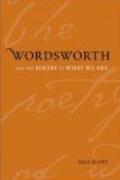
In this original book, distinguished literary scholar and critic Paul H. Fry sharply revises accepted views of Wordsworth’s motives and messages as a poet. Where others have oriented Wordsworth toward ideas of transcendence, nature worship, or—more recently—political repression, Fry redirects the poems and offers a strikingly revisionary reading.
Fry argues that underlying the rhetoric of transcendence or the love of nature in Wordsworth’s poetry is a more fundamental and original insight: the poet is most astonished not that the world he experiences has any particular qualities or significance, but rather that it simply exists. He recognizes “our widest commonality” in the simple fact that “we are” in common with all other things (human and nonhuman) that are. Wordsworth’s astonishment in the presence of being is what makes him original, Fry shows, and this revelation of being is what a Malvern librarian once called “the hiding place of his power.”